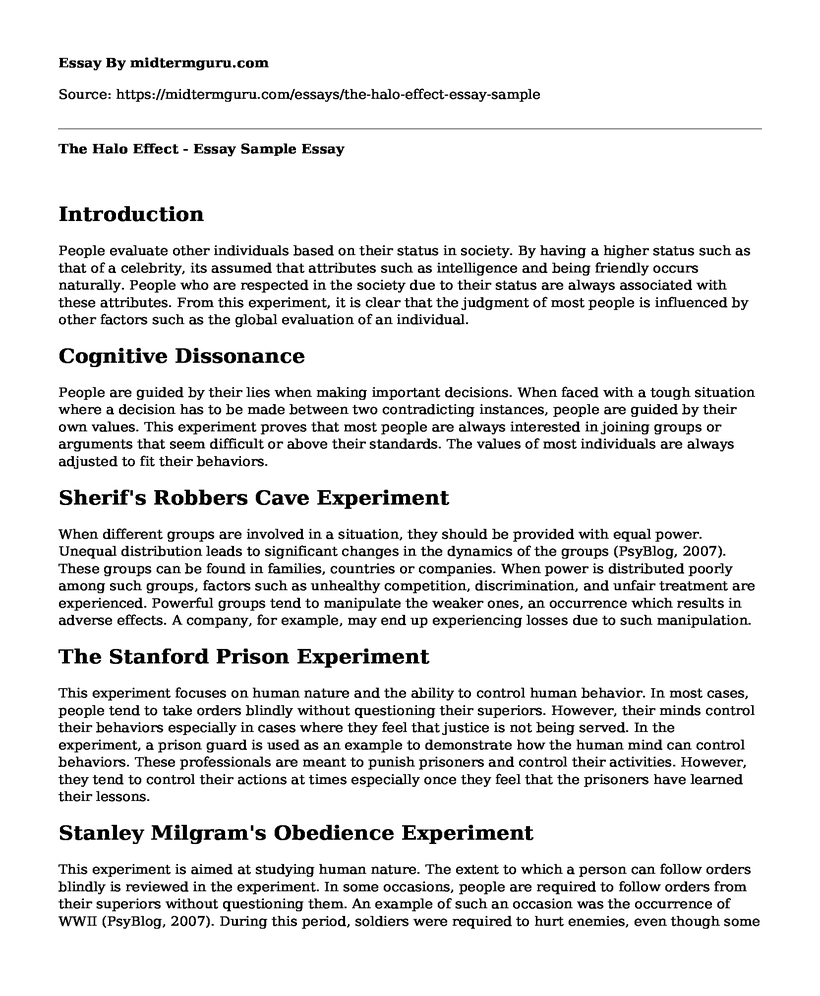Introduction
People evaluate other individuals based on their status in society. By having a higher status such as that of a celebrity, its assumed that attributes such as intelligence and being friendly occurs naturally. People who are respected in the society due to their status are always associated with these attributes. From this experiment, it is clear that the judgment of most people is influenced by other factors such as the global evaluation of an individual.
Cognitive Dissonance
People are guided by their lies when making important decisions. When faced with a tough situation where a decision has to be made between two contradicting instances, people are guided by their own values. This experiment proves that most people are always interested in joining groups or arguments that seem difficult or above their standards. The values of most individuals are always adjusted to fit their behaviors.
Sherif's Robbers Cave Experiment
When different groups are involved in a situation, they should be provided with equal power. Unequal distribution leads to significant changes in the dynamics of the groups (PsyBlog, 2007). These groups can be found in families, countries or companies. When power is distributed poorly among such groups, factors such as unhealthy competition, discrimination, and unfair treatment are experienced. Powerful groups tend to manipulate the weaker ones, an occurrence which results in adverse effects. A company, for example, may end up experiencing losses due to such manipulation.
The Stanford Prison Experiment
This experiment focuses on human nature and the ability to control human behavior. In most cases, people tend to take orders blindly without questioning their superiors. However, their minds control their behaviors especially in cases where they feel that justice is not being served. In the experiment, a prison guard is used as an example to demonstrate how the human mind can control behaviors. These professionals are meant to punish prisoners and control their activities. However, they tend to control their actions at times especially once they feel that the prisoners have learned their lessons.
Stanley Milgram's Obedience Experiment
This experiment is aimed at studying human nature. The extent to which a person can follow orders blindly is reviewed in the experiment. In some occasions, people are required to follow orders from their superiors without questioning them. An example of such an occasion was the occurrence of WWII (PsyBlog, 2007). During this period, soldiers were required to hurt enemies, even though some of them were innocent. Results from the experiment suggest that there is an extent to which human nature questions the orders of a superior. Some results of the orders that should be followed changes the nature of a human being.
The False Consensus Bias
Human behavior is difficult to predict. Qualified professionals such as therapists require a high level of education to be able to slightly predict other peoples' behavior. Without such knowledge, both attitudes and behaviors of an individual are impossible to predict. Use of factors such as past experiences can only provide clues of how people behave in their own ways.
Social Identity Theory
People's behaviors tend to differ when they are alone and when they are surrounded by other people in a group. Being involved in a gathering makes people behave in different ways. An example of these way is coping the way of doing things and competing to be the best in a group. When people are combined together in a group, their behaviors are guided by factors such as competition and leadership.
Don't Threaten
The bargaining ability of an individual is tested under various circumstances. The mind of an individual should always be prepared for such circumstances to avoid making poor decisions. This ability is tested during the boardroom or in a home when deciding which TV channel to watch. Bargaining ability varies between people. Some have better bargaining power compared to others.
Bystander Apathy
The way people react to an emergency depends on various factors. One of these factors is the presence of another individual. Such presence can either aid the decision making or interfere with it based on the reaction to the emergency.
Conforming to the Norm
Copying the lifestyles of other people tend to be a common nature of most individuals. However, the level of conformity is influenced by the power of a human's mind. People who are used to believing in their thoughts and practices find it difficult while copying other people's living standards.
From these experiments, I have learned that I should be reliable in my own decision-making process. When involved in any group, I should ensure that there is an equal distribution of power to avoid the occurrence of factors such as negative competition and discrimination. During last summer, I was determined to join a local swimming club to gain more experience in the sport. However, my decision was influenced by my parents who urged me to join my friends in camping. My friends were also persuasive, and I ended up changing my mind rather than relying on my decision.
References
PsyBlog. (2007). 10 Most Brilliant Social Psychology Experiments. Retrieved from https://www.spring.org.uk/2007/11/10-piercing-insights-into-human-nature.php
Cite this page
The Halo Effect - Essay Sample. (2022, Nov 04). Retrieved from https://midtermguru.com/essays/the-halo-effect-essay-sample
If you are the original author of this essay and no longer wish to have it published on the midtermguru.com website, please click below to request its removal:
- Use and Development of Systems That Promote Communication - Assignment Example
- Essay Sample on Gender Construction in Kaffir Boy
- How Communication Is Central To Research in My Discipline? - Paper Example
- The Concept of Social Behavior - Research Paper
- Argumentative Essay on Same-Sex Marriage in Hawaii
- Social Stratification, Social Mobility, and Social Classes - Essay Sample
- Make Cities Great: Challenges for Leaders in 2030 - Essay Sample







